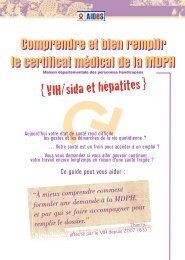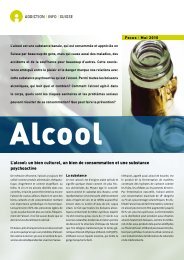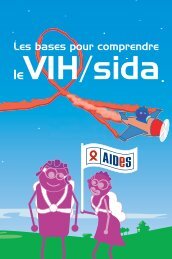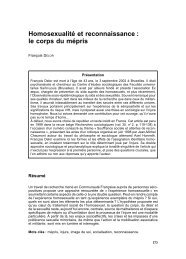<strong>Care</strong> <strong>and</strong> <strong>support</strong> <strong>for</strong> <strong>people</strong> <strong>living</strong> <strong>with</strong> <strong>HIV</strong>/<strong>AIDS</strong>Health care: where are the gaps?Despite decades of ef<strong>for</strong>t by communities <strong>and</strong> governments to improve access tohealth care, <strong>and</strong> despite the help of WHO <strong>and</strong> other institutions, the health sectordeficiencies in the developing world appear to be growing instead of shrinking.Even be<strong>for</strong>e the epidemic, the health care system did not get a fair share of thenational budget. Typically, health centres <strong>and</strong> hospitals were short-staffed, facilities<strong>for</strong> diagnosis were inadequate <strong>and</strong> drug supplies erratic, <strong>and</strong> training <strong>for</strong> health careproviders was uneven <strong>and</strong> often poor. These deficiencies have worsened <strong>with</strong> thearrival of the <strong>HIV</strong> epidemic, which has increased the dem<strong>and</strong>s <strong>for</strong> health care <strong>and</strong>simultaneously reduced the health system’s capacity to respond (see page 31).In the poorer developing countries, local health centres <strong>and</strong> small hospitals lackadequate facilities to diagnose the opportunistic diseases of <strong>people</strong> <strong>with</strong> <strong>HIV</strong>. Theyrepeatedly run out of supplies of essential drugs, including the ones needed to alleviatedistressing symptoms <strong>and</strong> to manage opportunistic infections. For example,oral thrush – a fungal disease which causes pain on swallowing – could be treatedrelatively easily, but millions of patients continue to suffer <strong>for</strong> lack of a simple antifungaldrug. Tuberculosis, which can be cured, often goes untreated <strong>for</strong> the samereason. In Zambia, <strong>for</strong> example, where the tuberculosis case-load increased sixfoldbetween 1992 <strong>and</strong> 1998, proper treatment became increasingly problematicbecause health facilities kept running out of TB drugs.Even big teaching hospitals affiliated <strong>with</strong> urban medical schools – supposedly thebest-supplied part of the health system – have serious problems, to judge from aUN<strong>AIDS</strong> survey of 22 university teaching hospitals in 19 African <strong>and</strong> 3 Asian citiescompleted in 1997. The hospitals surveyed had suitable diagnostic facilities <strong>and</strong> theright drugs to treat three conditions – pneumonia, pulmonary tuberculosis <strong>and</strong> oralthrush. These are the only <strong>HIV</strong>-related conditions that are easy to diagnose <strong>and</strong> inexpensiveto treat. For any other <strong>HIV</strong>-related illness, diagnostic capacity (X-ray <strong>and</strong> laboratoryfacilities) <strong>and</strong> drug supplies were so inadequate that a patient would haveless than a 50% chance of being correctly diagnosed <strong>and</strong> treated. This was true, <strong>for</strong>instance, of Kaposi sarcoma (a frequent <strong>HIV</strong>-related cancer), serious fungal infectionssuch as cryptococcal meningitis, <strong>and</strong> viral infections affecting the brain. Relief<strong>for</strong> difficulty in breathing was unavailable in half the hospitals. Strong painkillers wereavailable in only two-fifths, despite the fact that most <strong>people</strong> <strong>with</strong> advanced <strong>HIV</strong>infection require pain control at some point.The high costs of antiretroviral drugs, <strong>and</strong> the sophisticated medical facilities requiredto track patients’ progress <strong>and</strong> monitor side-effects, have been major stumblingblocks to access <strong>for</strong> the vast majority of <strong>people</strong> <strong>with</strong> <strong>HIV</strong> in the developing world.Enormous variations in access to antiretrovirals exist in middle-income countries. Inmost of Asia, <strong>people</strong> <strong>with</strong> <strong>HIV</strong> have limited access. In Thail<strong>and</strong>, <strong>for</strong> instance, the89
Report on the global <strong>HIV</strong>/<strong>AIDS</strong> epidemic – June 2000Government subsidizes the cost of antiretroviral drugs <strong>for</strong> patients enrolled in clinicaltrials in a few centres of excellence, but this currently ensures access <strong>for</strong> onlyaround 2000 of the approximately 70 000 new <strong>AIDS</strong> cases occurring annually.A few projects in sub-Saharan Africa aim to promote the rational use of treatment <strong>for</strong><strong>people</strong> <strong>with</strong> <strong>HIV</strong>, including antiretrovirals (see Box 19, page 103). Even <strong>with</strong>in theprojects it has repeatedly been problematic <strong>for</strong> patients <strong>with</strong> opportunistic infectionsto have access to the essential drugs they need. Outside these projects, antiretroviralscan only be purchased from a poorly regulated private sector where concernsabout inefficiency <strong>and</strong> the potential <strong>for</strong> counterfeit loom large.There are some Latin American <strong>and</strong> Caribbean countries where even treatment <strong>for</strong>opportunistic infections is problematic. However, other countries in the region haveresponded to dem<strong>and</strong>s from groups of patients, doctors <strong>and</strong> human rights organizations<strong>and</strong> now lead the developing world in providing access to antiretrovirals.Argentina, Brazil, Colombia, Costa Rica <strong>and</strong> Uruguay provide a legal right to some<strong>for</strong>m of antiretroviral therapy, though the application of the law is somewhat patchy.Coverage of eligible patients has been reported to be 100% in Brazil, 70% inArgentina, 65% in Chile <strong>and</strong> Uruguay, 40% in Panama <strong>and</strong> 20% in Ecuador. Somecountries operate <strong>with</strong> a lottery system or limit antiretroviral drug access to those<strong>with</strong> social security or private health insurance. Experience in Brazil shows that thecosts of such therapy, although high, are offset to some extent by savings on treatment<strong>for</strong> opportunistic infections <strong>and</strong> on hospital stays (see Box 18, page 101).Nevertheless, some concern has been voiced over the risk that <strong>HIV</strong> prevention activitiesmay suffer if too much ef<strong>for</strong>t <strong>and</strong> money is devoted to providing treatment.90











